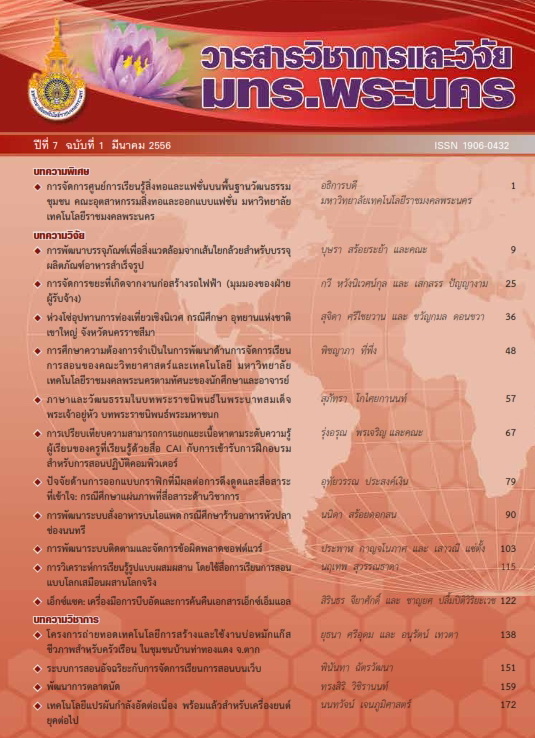การจัดการขยะที่เกิดจากงานก่อสร้างรถไฟฟ้า (มุมมองของฝ่ายผู้รับจ้าง)
Main Article Content
Abstract
บทค
ัดย่อ
การวิจัยนี้ศึกษาความคิดเห็นเกี่ยวกับการจัดการขยะที่เกิดจากงานก่อสร้างรถไฟฟ้า 3 สาย ประกอบด้วย สายสีน้ำเงิน สายสีแดง และสายสีม่วง เพื่อศึกษาประเภทของขยะและแนวทางการจัดการขยะจากการก่อสร้าง โดยใช้แบบสอบถามสุ่มถามผู้รับจ้างงานก่อสร้างรวมทั้งสิ้น 22 ตัวอย่าง จากบริษัท ชิโน-ไทย เอ็นจีเนียริ่ง แอนด์ คอนสตรัคชั่น จำกัด (มหาชน) บริษัท กิจการร่วมค้า ซีเคทีซี บริษัท กิจการร่วมค้า เอสเอช-ยูเอ็น และบริษัทยูนิค เอ็นจีเนียริ่ง แอนด์ คอนสตรัคชั่นจำกัด (มหาชน) พบว่า ปริมาณขยะโดยเฉลี่ยที่เกิดในช่วงเริ่มก่อสร้างและระหว่าง การก่อสร้าง( = 2.54 , SD = 0.80) มีปริมาณขยะมากกว่าช่วงสิ้นสุดการก่อสร้าง ( = 1.97, SD = 0.72 ) ในฝ่ายผู้บริหารพบว่า สาเหตุของปัญหาขยะเกิดจากการวางแผนและกำหนดนโยบาย เช่น การเร่งงานมากเกินไป การจัดบริเวณที่กองวัสดุไม่เหมาะสมและการวางแผนใช้วัสดุไม่รัดกุม ส่วนฝ่ายผู้ปฏิบัติงานพบว่าเกิดจากตัวบุคคล เช่น การขนย้ายวัสดุจากที่กองเก็บไปยังหน้างานคนงานขาดความเชี่ยวชาญในการทำงานและหัวหน้างานขาดการติดตามตรวจสอบงาน สำหรับการส่งเสริมการจัดการขยะที่ควรดำเนินการมากที่สุด คือ การอบรมให้ความรู้ แก่ผู้ควบคุมงาน ( = 3.44 , SD = 0.73 )
Abstract
The purpose of this research paper is to study the solid waste management to the following 3 lines of BTS Sky train construction projects: blue line, red line, and violet line. The study was carried out by distributing questionnaires to 22 randomly selected contractors on the site from Sino-Thai Engineering and Construction Plc., CKTC Joint Venture Co., SH-UN Joint Venture Co., and Unique Engineering and Construction Plc. The results of the survey showed that an average quantity of solid waste during the commencement of the project and reached to = 2.54, SD = 0.80 during construction period. However, the quantity of solid waste was higher upon the termination of the project = 1.97, SD = 0.72. For some managers, the problems of solid waste were caused by planning and policy making, such as too much rush work, unsuitable material management area, and misleading materials planning. The other contributors to the problem were traced from operators’ material transportation to the site. Workers have a lack of the expertise to work. Supervisors have a lack of monitoring and supervisory work. Supervisors’ training on waste management played a vital role in promoting solid waste management ( = 3.44, SD = 0.73).


